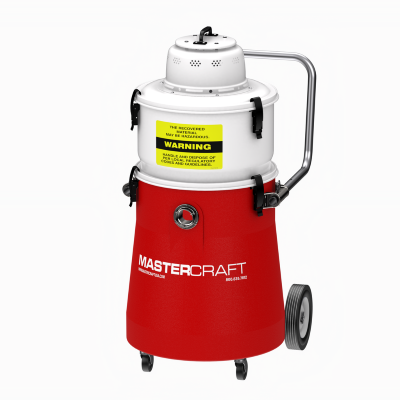Updated June 21, 2023
When it comes to heavy-duty cleaning, few tools are as up to the task as an industrial vacuum cleaner.
These powerful cleaners are designed to take on even the toughest messes and can quickly work out dirt, grime, and other kinds of nasty waste. But operating an industrial-grade vacuum can be a bit daunting if you've never used a tool of its kind before.
Plus, the world of industrial vacuum cleaners can be a little bewildering for anyone new to it. There are many different types and brands, each with distinct features and benefits. Whether you're shopping for your first commercial vacuum cleaner or want to upgrade from an older model, it pays to do your research first.
This guide covers everything you need to know when buying an industrial vacuum cleaner for your business or industrial property. We'll begin by explaining the main differences between various types of vacuum, including what makes them suitable for a factory environment and the pros and cons of each type.

WHAT IS AN INDUSTRIAL VACUUM CLEANER?
An industrial vacuum is a powerful cleaning tool designed for heavy-duty use. These vacuums are typically much more robust than regular household commercial vacuum cleaner models. As a result, they're built to withstand continuous use in tough environments.
The type of vacuum you choose will ultimately depend on the dirt or heavy-duty materials you want to remove from your premises, as well as how frequently you need to clean the area.
In a factory work environment, vacuums are used for everything from basic cleaning and removing dust and small bits of waste from the floor to sucking up spilled liquids like oil and coolant. They can also be used to clean and remove machinery and equipment dust.
THE BENEFITS OF INDUSTRIAL VACUUMS
GREATER VERSATILITY
Industrial vacuums are designed to tackle a wider variety of dirt than their domestic counterparts. Industrial vacuums are often big and bulky, with a powerful suction that's strong enough to lift large pieces of debris as well as suck up liquids.
The vacuum pump and motor are usually more powerful on industrial models, making them much more versatile than a domestic vacuum cleaner.

BETTER FILTRATION
Airflow and negative pressure are two important aspects of industrial vacuum systems. These machines typically have more robust motors that create a higher negative pressure.
Another key feature of industrial vacuums is their superior filtration systems. This is especially noticeable with bagged vacuums, which often have better filtration than bagless models.
Fine dust particles are trapped in the bag rather than being blown back into the air. A HEPA filter is also used to trap particles as small as 0.3 microns, making them ideal for use in environments where dust control is a priority.
LONGER LIFESPAN
Another benefit of these vacuums is that they typically have a longer lifespan than domestic models. This is because they have a stronger build quality and thus are designed to cope with much harsher conditions and bear a heavier workload than a household cleaning machine.
MORE POWERFUL SUCTION
One of the essential features of an industrial vacuum is its greater suction ability. The negative pressure created by the powerful motor can suck up more dirt and waste than a domestic unit.
INDUSTRIAL VACUUM TYPES
When it comes to the different types of industrial vacuum cleaners, there are four main categories: wet, dry, bagless, and bagged.
Let's take a brief look at each type.

WET VACUUMS
Wet vacuums (also known as wet and dry vacs) are designed to suck up both dry and liquid messes from the floor. Their powerful suction is capable of sucking up liquids and solids at the same time.
Due in part to their greater versatility and motor power, wet/dry vacuums are typically more expensive than other types of vacuums.
DRY VACUUMS
Dry vacuum cleaners are designed to suck up only dry matter, such as dirt. As a result, a dry vacuum cleaner tends to be both cheaper and smaller than a wet vacuum.
BAGLESS VACUUMS
Bagless vacuums have a permanent filter bag inside the machine, which is designed to trap dirt and particles.
While you don't need to swap out the filter bag (unlike with bagged vacuum cleaners), you do need to clean the filter bag regularly to ensure the unit is working properly during each use.
BAGGED VACUUMS
Unlike bagless vacuums, bagged vacuums use a changeable bag rather than a filter to collect production waste, dirt, and more.
In the case of a bagged vacuum cleaner, you need to must regularly change the bag as well as clean the machine in order to maintain optimal performance.
CLEANING NEEDS TO CONSIDER WHEN BUYING AN INDUSTRIAL VACUUM
THE CLEANING YOU NEED TO DO
Different floor types and debris require different types of vacuum, so you should choose a vacuum best suited to your cleaning needs.
TYPE OF FILTRATION SYSTEM
This is especially important if you are sucking up a lot of liquid or have employees whose material handling responsibilities include toxic substances. A bagged vacuum is preferable in this case because it prevents liquid from gumming up the inner workings of the unit.
SIZE OF THE MACHINE
If you need a vacuum for indoor use, you want one that is lightweight and easy to maneuver. If you need it for outdoor use, you want a cleaner that has a longer lifespan and is built to withstand harsh conditions.
FILTERS
Some vacuums come equipped with a filter, while others don't. If you don't mind cleaning the filter regularly in lieu of swapping out disposable vacuum bags, then a vacuum with a filter just might be for you.
MESH SLEEVES
Some models come with cylindrical sleeves with mesh inside, which allows you to clean the inside of dust collectors, machinery, and other hard-to-reach places with relative ease.

HOW MUCH SHOULD YOU SPEND ON AN INDUSTRIAL VACUUM?
Like any purchase, the price of the vacuum will depend on the features you need and want. The cost of an industrial vacuum can range from a few hundred dollars to several thousand.
The most expensive models tend to be wet/dry vacuums designed to handle the most challenging cleaning tasks. Cheaper models are intended for lighter cleaning jobs, such as sucking up dry waste from concrete floors.
BRANDS TO LOOK OUT FOR
Most major cleaning brands offer industrial vacuum cleaners, which come in various types and price points.
In the wet and dry vacuum category, brands like Miele, Electrolux, and Kirby are some of the most popular.
For bagged vacuums, brands like Bissell, Hoover, and Dirt Devil are a few more popular ones.
If there's one thing this guide should have taught you, there are many different types of vacuum out there, each with its unique features and benefits.
What you choose will depend on your specific cleaning needs. Choosing wisely when buying an industrial vacuum is essential to get the best value for your money.

A GUIDE TO HELP YOU GET STARTED
Here's a quick guide to help you get started once you've purchased an industrial vacuum cleaner for your business:
CHOOSE THE SUITABLE MODEL FOR YOUR NEEDS
There are a variety of industrial vacuums available on the market, so it's crucial to select the model best suited for your particular application.
If you're ever unsure of which model to choose, don't hesitate to consult with a professional in the field of industrial- and commercial-grade cleaning products.
READ THE INSTRUCTIONS CAREFULLY
Once you've selected the right model for your company's needs, read the instruction manual thoroughly before operating the vacuum.
This will help you understand how the model works and ensure that you operate it correctly, as well as know the appropriate frequency for upkeep and maintenance (changing out the filter, cleaning the inside, etc.).
SET UP THE VACUUM PROPERLY
Before you start using the vacuum, take a few minutes to set it up properly. This includes connecting all the included hoses and attachments and ensuring that the power cord is plugged in securely.
VACUUM ATTACHMENTS ARE KEY
Most industrial vacuums come with various attachments that can be used for different applications and cleaning jobs.
These attachments can help you reach tight spaces and corners, as well as make it easier to vacuum larger areas.
START VACUUMING!
Once you've set up everything, turn on the vacuum and start cleaning. Remember to move slowly and methodically so that you don't miss any areas, and be sure to empty the vacuums dustbin when it gets full.
WHEN SHOULD YOU USE AN INDUSTRIAL VACUUM CLEANER?
The best time to use an industrial vacuum is whenever your floor is covered in dirt and similar waste. For example, combustible dust is a significant concern in many industrial environments. To minimize the risk of explosion and maintain workplace safety, it's important to vacuum regularly and ensure that all combustible dust is removed from the work area.
However, remember that not all types of dirt and gunk are suitable for these particular cleaning machines. For instance, you should avoid using an industrial vacuum to suck up tiny particles such as sawdust, wood chips, or liquids like water or oil (unless you have a wet/dry model). Some models may not be able to handle metal shavings (such as steel mills), either.
Bagged vacuums are better suited for sucking up large pieces of liquid and solid matter from concrete or wooden floors. Meanwhile, bagless vacuums are better at sucking up heavier dirt from concrete, such as sand and grit.
Finally, a backpack vacuum is a good choice for vacuuming hard-to-reach areas, such as ceiling corners and tight spaces.
WRAPPING UP
An industrial vacuum cleaner is a powerful asset that can make light work of even the most challenging cleaning tasks. They are available in various types and at different price points, so you should carefully consider your business's specific needs before purchasing.
This guide has provided you with some essential things to look for when buying an industrial vacuum, as well as some of the top brands to consider. With this information in mind, you're well on your way to finding the perfect vacuum for your industrial facility.
With these simple tips, you'll be able to use an industrial vacuum like a pro in no time. So don't be afraid to try out MastercraftUSA's complete line of powerful cleaning machines the next time you need to tackle a big clean-up job!
1 Comment